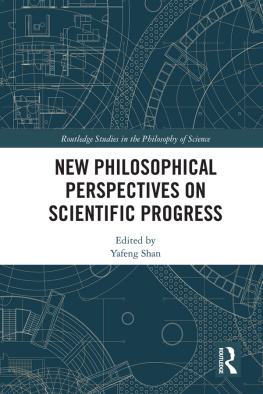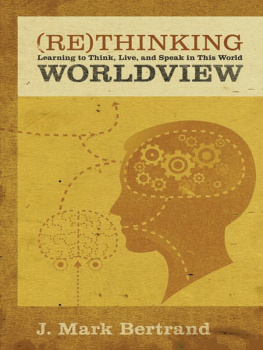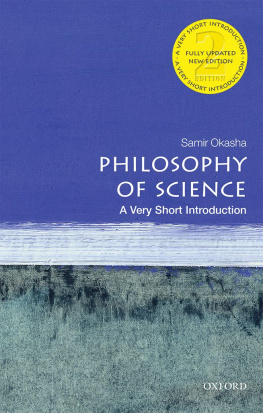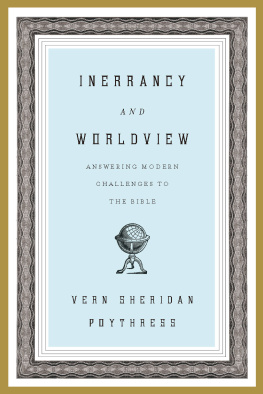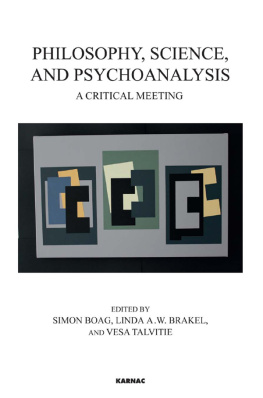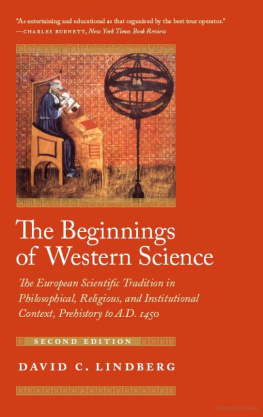Praise for Worldviews
Quite simply, this is one of the most accessible and teachable introductions to the history and philosophy of science Ive seen in over two decades of teaching. DeWitts exposition and discussion manifestly honed by extensive classroom teaching experience are exceptionally clear, and helpfully complemented by some of the best diagrams Ive seen. DeWitt thus makes complex ideas and developments cogent and straightforward, especially for undergraduates and those approaching the history and philosophy of science for the first time. Charles Ess, Drury University
Richard DeWitts Worldviews is a splendid introductory text. It is organized around themes traditions and their overthrow geared to engage undergraduates. It is historically informed and philosophically sensible. Best of all, it abounds in examples skillfully drawn from the physical sciences and made accessible to the non-specialist. The philosophy of science students encounter through Worldviews will strike them as the philosophy of real science the science of Newton, Einstein, Copernicus, and Aristotle and not some denatured surrogate for science concocted by philosophers so that it might succumb to the tools of their trade. Laura Ruetsche, University of Pittsburgh
This is a brilliantly clear introduction (and indeed reframing) of the history and philosophy of science in terms of world-views and their elements ... In addition, the book is incredibly well-informed from both a scientific and philosophical angle. Highly recommended. Scientific and Medical Network
This second edition first published 2010
2010 Richard DeWitt
Edition history: Blackwell Publishing Ltd (1e, 2003)
Blackwell Publishing was acquired by John Wiley & Sons in February 2007. Blackwells publishing program has been merged with Wileys global Scientific, Technical, and Medical business to form Wiley-Blackwell.
Registered Office
John Wiley & Sons Ltd, The Atrium, Southern Gate, Chichester, West Sussex, PO19 8SQ, United Kingdom
Editorial Offices
350 Main Street, Malden, MA 02148-5020, USA
9600 Garsington Road, Oxford, OX4 2DQ, UK
The Atrium, Southern Gate, Chichester, West Sussex, PO19 8SQ, UK
For details of our global editorial offices, for customer services, and for information about how to apply for permission to reuse the copyright material in this book please see our website at www.wiley.com/wiley-blackwell.
The right of Richard DeWitt to be identified as the author of this work has been asserted in accordance with the UK Copyright, Designs and Patents Act 1988.
All rights reserved. No part of this publication may be reproduced, stored in a retrieval system, or transmitted, in any form or by any means, electronic, mechanical, photocopying, recording or otherwise, except as permitted by the UK Copyright, Designs and Patents Act 1988, without the prior permission of the publisher.
Wiley also publishes its books in a variety of electronic formats. Some content that appears in print may not be available in electronic books.
Designations used by companies to distinguish their products are often claimed as trademarks. All brand names and product names used in this book are trade names, service marks, trademarks or registered trademarks of their respective owners. The publisher is not associated with any product or vendor mentioned in this book. This publication is designed to provide accurate and authoritative information in regard to the subject matter covered. It is sold on the understanding that the publisher is not engaged in rendering professional services. If professional advice or other expert assistance is required, the services of a competent professional should be sought.
Library of Congress Cataloging-in-Publication Data
DeWitt, Richard.
Worldviews : an introduction to the history and philosophy of science / Richard DeWitt. 2nd ed.
p. cm.
Includes bibliographical references and index.
ISBN 978-1-4051-9563-8 (pbk.); ISBN 978-1-4443-9276-0 (ePub)
1. ScienceHistory. 2. SciencePhilosophy. I. Title.
Q125.D38 2010
509dc22
A catalogue record for this book is available from the British Library.
For Susie
List of Figures
1.1 A grocery list of Aristotles beliefs
1.2 Aristotles jigsaw puzzle of beliefs
2.1 A peek into Saras consciousness
2.2 Saras conscious experience
2.3 The Total Recall scenario
5.1 Illustration of Euclidean axiom
8.1 Mars motion on the Ptolemaic system
10.1 Does the ball follow this path?
10.2 Or does the ball follow this path?
13.1 Treatment of Mars on the Ptolemaic system
13.2 The flexibility of epicycledeferent systems
13.3 Position of Mars against the backdrop of the fixed stars
13.4 Explanation of retrograde motion on the Ptolemaic system
13.5 Minor and major epicycles
14.1 The treatment of Mars on the Copernican system
14.2 Explanation of retrograde motion on the Copernican system
15.1 The Tychonic system
16.1 An ellipse
16.2 Orbit of Mars on Keplers system
16.3 Illustration of Keplers second law
16.4 Nested sphere, cube, and sphere
16.5 Keplers construction
16.6 Keplers construction with the solids removed
17.1 Photo of sun and planets
17.2 Sun-centered interpretation of photo
17.3 Earth-centered interpretation of photo
17.4 Phases of Venus
17.5 Phases of the moon
17.6 Sun, Venus, and Earth on the Ptolemaic system
17.7 Sun, Earth, and Venus on a sun-centered system
22.1 Boat and swimmer analogy
22.2 The swimmers return at different times
23.1 Illustration for special relativity
23.2 Snapshot A
23.3 Snapshot B
23.4 A typical Cartesian coordinate system
24.1 Magnetic field lines
24.2 Typical field lines in general relativity
25.1 Electrons as particles
25.2 Electrons as waves
25.3 The particle effect and the wave effect
25.4 Two-slit experiment with electron detectors
25.5 Beam splitter experiment
25.6 Families of wave mathematics
25.7 Representation of a wave equation
25.8 Adding family members to produce a particular wave
25.9 Members of another family can produce the same wave
25.10 Representation of the wave function for an electron in a particular setting
25.11 Families associated with measurements
25.12 Wave function for electron
25.13 Family P associated with measurements of position
25.14 Wave function decomposed into members of Family P
25.15 Beam splitter arrangement
25.16 Schrodingers cat
26.1 A typical EPR setup
26.2 Coke machine analogy
26.3 Modified EPR scenario
28.1 Prisoners dilemma payoff matrix
28.2 Ultimatum game payoff matrix
28.3 Trust game payoff matrix
Acknowledgments
Countless people made contributions to both the first and second editions of this work. Some contributions were large, some small, but all of them were important. In the first edition, and for this edition as well, numerous anonymous reviewers provided helpful feedback, sometimes catching outright mistakes and sometimes providing good suggestions for clarifying discussions. I would like to acknowledge their contributions. Over the years my philosophy of science students have read various earlier drafts of this book, and lately drafts of additional chapters, and they provided terrific feedback on which ideas worked and which did not, and which explanations were clear and which not so clear. There are too many of them to name, but I would like to thank them all for their help. Likewise I cannot begin to name, but I do appreciate, all the colleagues who have discussed these issues with me, read portions of the manuscript, and helped me clarify and oftentimes correct my thinking on various issues. I would again like to note the contributions of Charles Ess of Drury University, and Marc Lange of the University of Washington, both of whom read the drafts of the entire first edition, most of which is included in this edition, and provided lengthy, detailed, and helpful comments and suggestions (not to mention saving me from several embarrassing mistakes). In addition Id like to thank Todd Disotell and Shara Bailey of the Center for the Study of Human Origins, New York University, for their help in clarifying the material on evolution in an invigorating 2009 seminar on evolution, and the Faculty Resource Network for the financial support for that seminar. Finally, I would again like to thank my editor, Jeff Dean, for once again helping with the content of this work as well as smoothly facilitating the process of bringing it to press.


